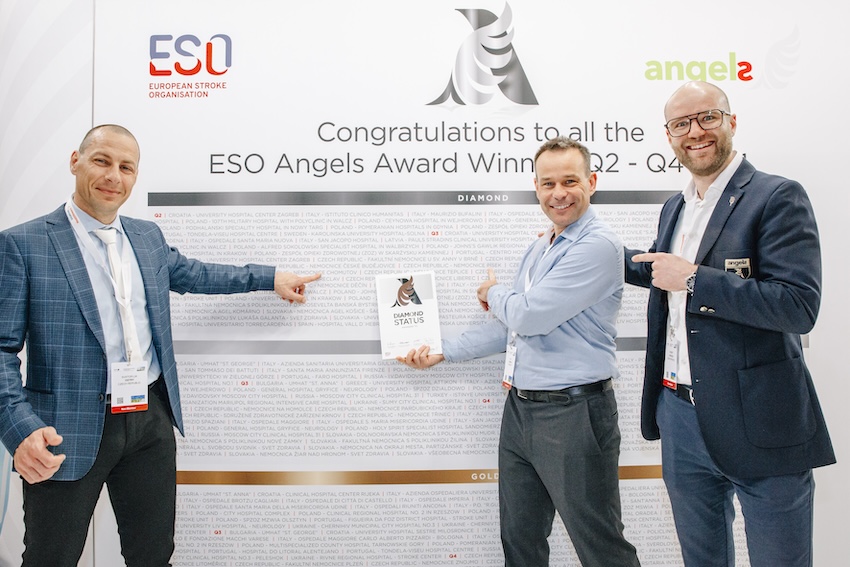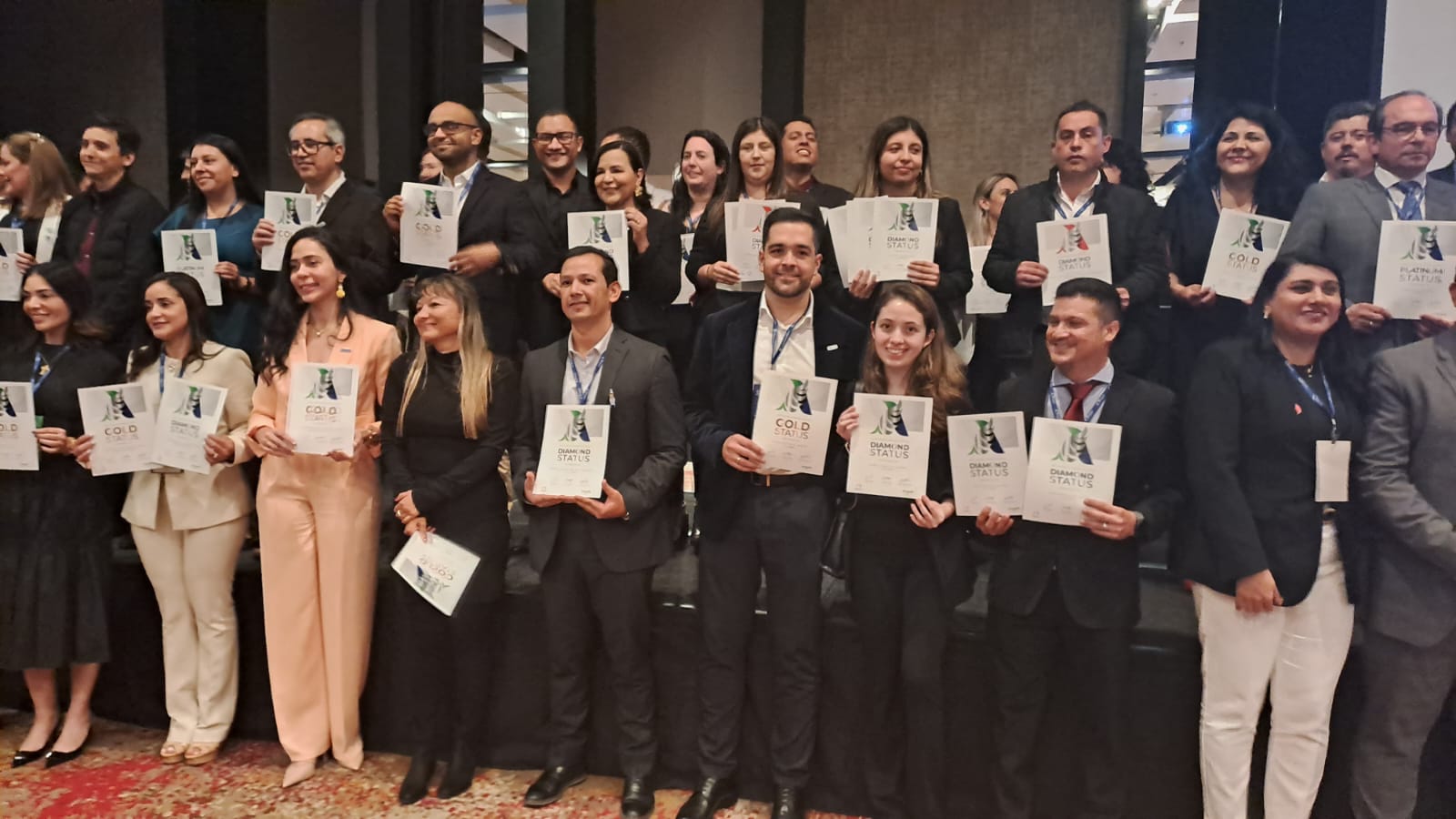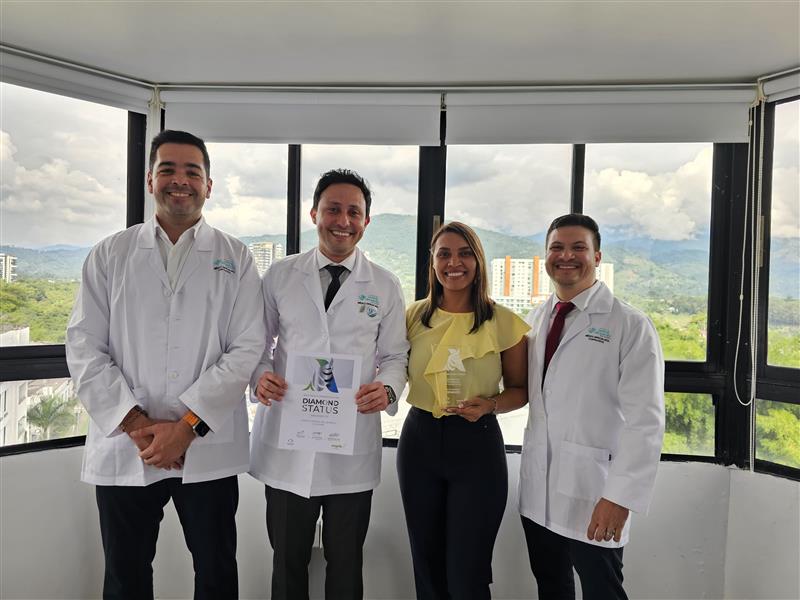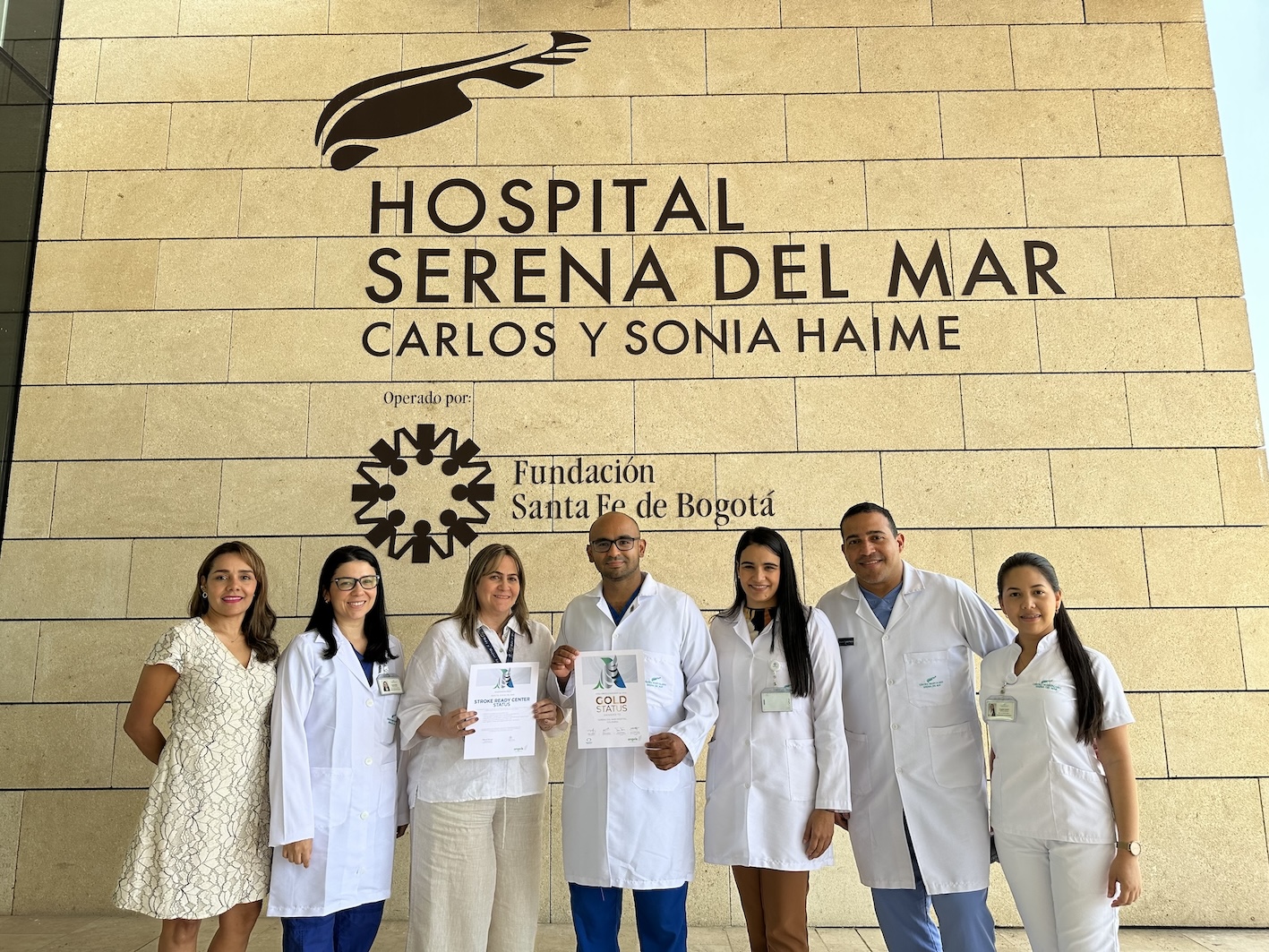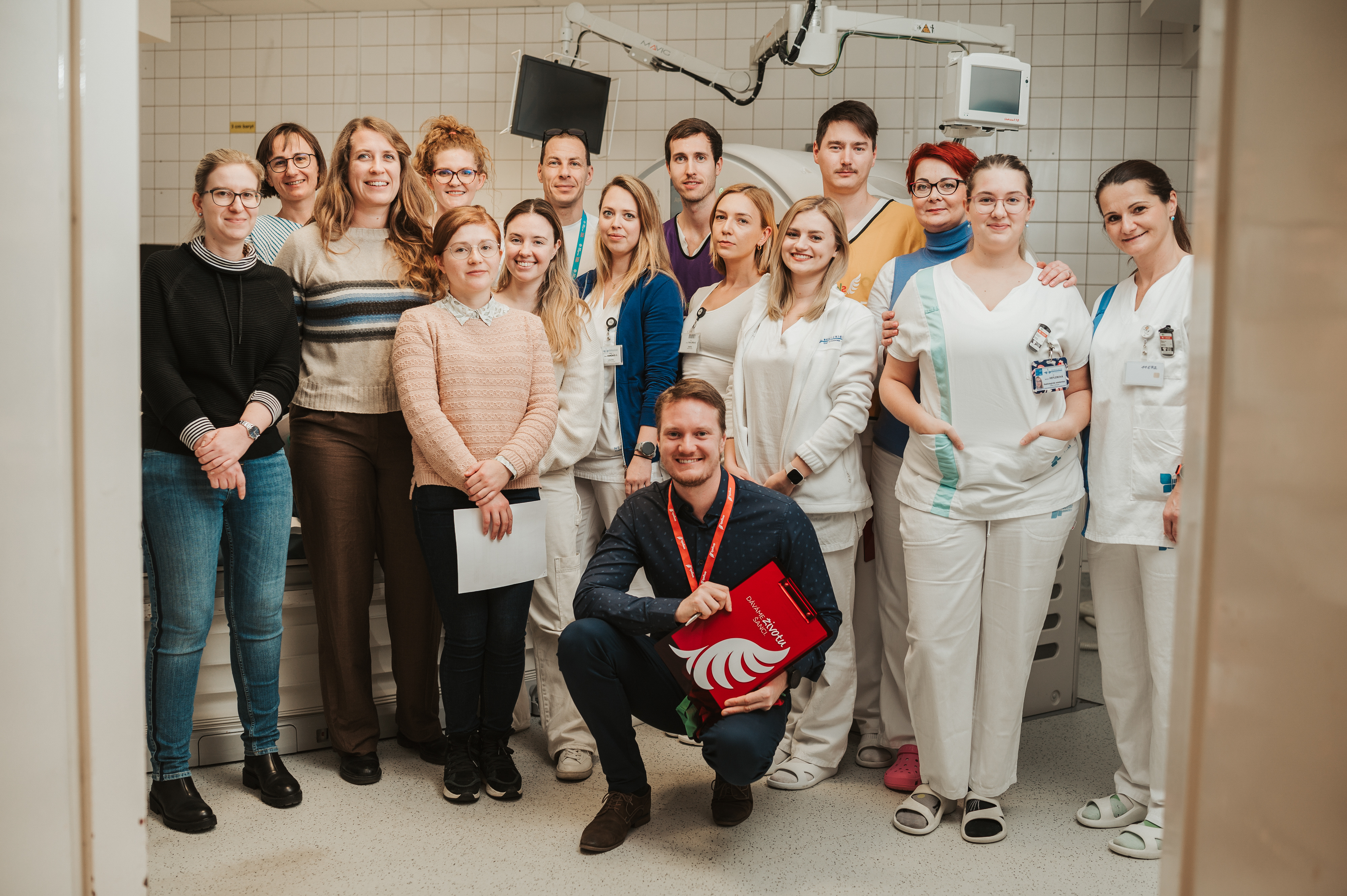
화요일 2023년 11월 21일에 오스트리아 어퍼의 Linz 신경과 전문의인 Caterina Kulyk 박사는 비정상적인 입장을 취했습니다. 체코 공화국의 남보헤미아 지역의 체스케 부데호비체 방문 중에 뇌졸중으로 인해 큰 불행을 겪었던 오스트리아 관광지의 연극이었습니다.
오스트리아의 관광지가 왜 여행 일정에 "예스케 부드"를 포함시키는지 알기란 어렵습니다. 잘 보존된 이 역사 센터에는 르네상스 및 바로크 건축의 훌륭한 예와 체코에서 가장 큰 분수들이 많이 있으며, 이 도시는 맥주로 유명합니다.
"뇌졸중 시뮬레이션 워크숍에서 Hospital MOXReské Bud MOXRjovice의 비상 입구를 통과하면서 Kulyk 박사는 방향감을 잃었습니다. “무슨 일이 일어나고 있는지 이해할 수 없었어요”라고 그녀는 설명합니다. 건강한 사람이라 하더라도 그 경험은 혼란스러웠고, 주변 사람들이 무슨 일이 일어나고 있는지, 다음 단계는 무엇인지 설명했을 때 매우 기뻤습니다."
이러한 환자 관점은 지난 11월 국가 간 시뮬레이션 연습 이후 Kepler University Hospital의 뇌졸중 치료에 영향을 미친 요인 중 하나입니다.
Angels 컨설턴트 Martin Liptay가 시뮬레이션이 어떻게 진행되었는지 설명합니다.
“ESOC 2023 동안 Robert Havalda(Angels 팀 리더)와 저는 당시 Linz의 Barmherzige Brüder 병원에서 근무했던 체코 신경과 전문의 Michaela Schober 박사의 연락을 받았습니다. Schober 박사는 그녀의 도시에서 시뮬레이션 교육을 할 수 있는지 물었습니다. 컨설턴트가 없기 때문에 체코 공화국의 선도적인 뇌졸중 센터 중 하나인 체스케 부드호비체의 종합 센터에서 시뮬레이션 교육을 진행하고 오스트리아 어퍼 지역의 뇌졸중 센터를 초대하는 것이 좋을 것이라고 생각했습니다.”
Dr Schober는 초대장을 통해 Kepler University Hospital을 포함한 5개 오스트리아 병원으로 나갔을 때 Linz를 떠났습니다. 이 병원은 이탈리아의 신경과 전문의인 Dr Kulyk이 방금 뇌졸중 병동 책임자로 존경받는 Dr Milan Vosko의 성공을 거머쥐었고 도착 후 주사 시간을 개선하는 데 집중했습니다.
“우리의 시간은 더 나아졌습니다.”라고 그녀는 말합니다. “그러나 여전히 개선의 여지가 있었습니다.”
"ESOC에서 우리는 şeské Bud MOXRjovice의 훌륭한 도착 후 주사바늘을 맞은 시간에 대해 들었습니다. 우리는 실제로 이웃 지역에서 일하고, 언덕과 계곡을 공유하는 것처럼, 동료들의 경험을 통해 관점을 교환하고 배우기를 기대했습니다. 또한 최고 신경과 전문의인 Svatopluk Ostr MOXR 박사가 매우 좋고 매우 쾌적했기에, 이는 매우 좋은 기회였다고 들었습니다.”
세 명의 동료가 Kulyk 박사를 동반하여 뇌졸중을 처음 접한 신경과 전문의이자 레지던트의 시작과 종료 시 각각 두 명의 레지던트인 South Bohemia를 방문했습니다. 린츠에서 차에스케 부디비체로 이동하는 데 2시간 미만이 걸렸습니다.
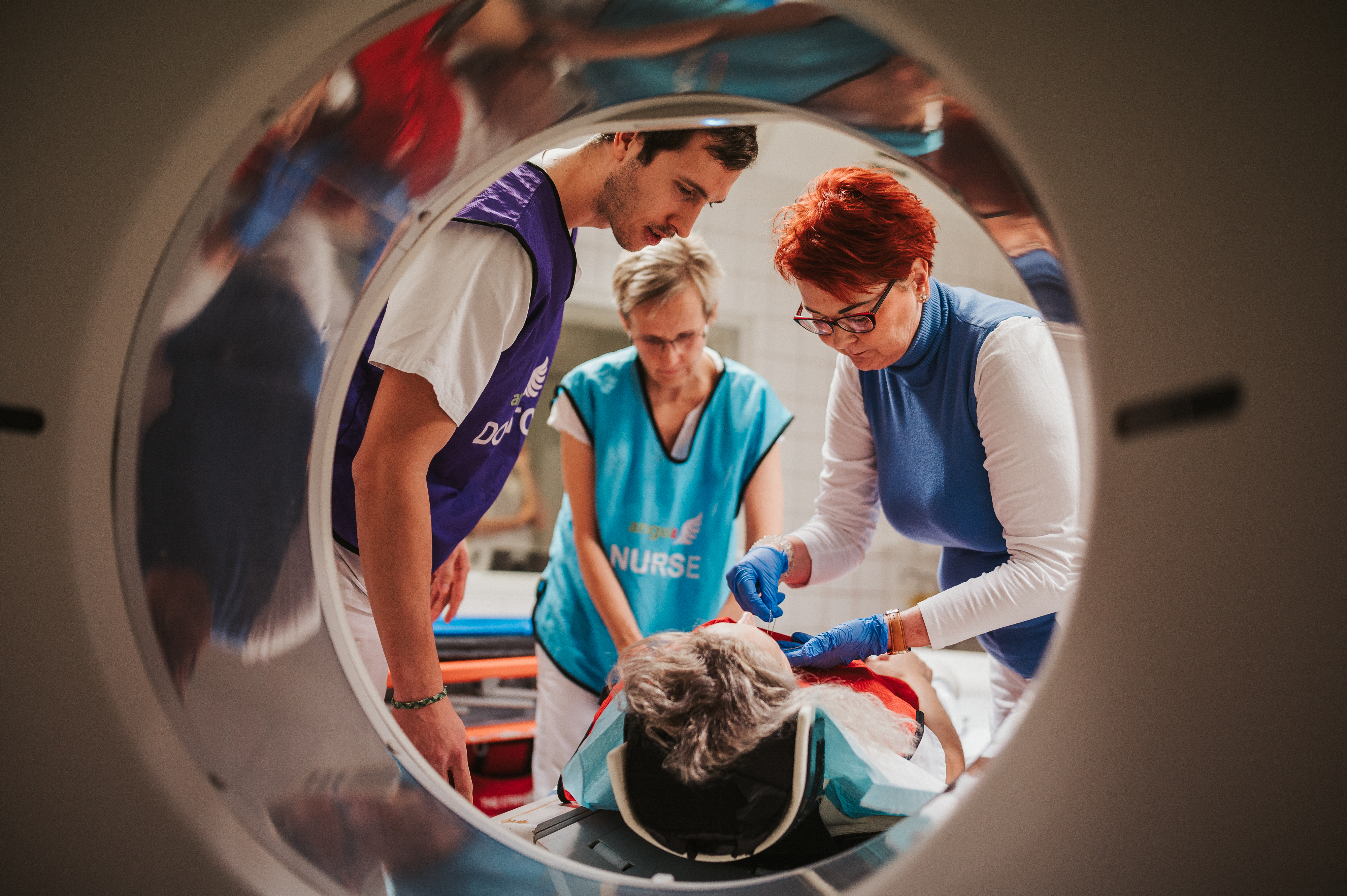
더 좋음, 더 빠름, 더 안전함
매우 좋고 매우 즐거운 Svatopluk Ostr� 박사는 2015년 Hospital MOXReské Bud MOXRjovice의 신경학과장이 되었으며, 프라하의 유명한 중앙 군대 병원의 신경외과 팀에서 신경생리학자로 11년 후 2012년에 이 자리에 도착했습니다. 그는 직장 생활과 사생활을 바꾸기 위해 남보헤미아로 이주했다고 말합니다. "여기는 꽤 큰 도시에 있는 대형 병원이었으나 프라하만큼 크지는 않았습니다. 프라하가 너무 컸습니다. 좀 더 작은 것이 필요했습니다.”
그럼에도 불구하고 신경외과 수술에서 수년 동안 이어졌던 또 다른 큰 주제를 다루기 위해 새로운 것을 시작할 기회였습니다.
그는 “그러므로 제 직장 생활을 바꾸고 개인 생활을 개선하는 것과 관련이 있었습니다.”라고 말합니다. 이 목표를 추구하면서 그는 병원을 뇌졸중 치료의 지표로 삼아 전국의 다른 어떤 시설보다 매년 더 많은 환자를 혈전용해술로 치료했으며, DTN 시간 중앙값은 15~18분 사이였고, 매년 두 번째로 높은 기계적 혈전제거술을 수행했으며, 3개의 ESO Angels 다이아몬드상을 수상했습니다.
버른 대학에서 뇌졸중 의학의 고급 연구 석사를 현재 추구하고 있는 Michaela Schober 박사는 LinkedIn에서 11월 시뮬레이션 사진을 공유했으며, “최고의 체코 병원”으로 체코 부드비체에 대한 설명을 적었습니다.
다음 질문을 Ostr MOXR 박사에게 요청합니다. 뇌졸중 치료의 우수성으로 인정받는 국가에서 어떻게 최고가 되고 있습니까?
답은 사례별로 개선하는 것입니다. “이는 일상의 진료에 기반합니다”라고 Ostr MOXR 박사는 설명합니다. "매일 모든 사례를 검토하고, 다시 검토하고, 개선될 수 있는 방법에 대해 생각하는 것입니다. 진단부터 치료까지 모든 사례에 대한 감사를 실시하여 약점을 찾고 규칙을 조정하여 피할 수 있도록 해야 합니다.”
11년 전에 남보헤미아에 도착했을 때 뇌졸중에 대한 사고방식을 바꾸려면 “열정적인” 논의가 필요하다고 그는 말합니다. 모든 사람이 중요한 피드백을 듣거나 더 나아지고, 더 빠르고, 더 안전한 업무 수행 방법이 있었다는 것을 받아들일 의향이 똑같이 없었습니다. "우리는 뇌졸중 환자에 대해 다르게 생각하도록 사람들을 설득해야 했습니다. 각 사례를 도울 기회로 보고, 뇌졸중 환자가 들어오면 우리는 그들의 운명을 바꾸기 위해 왔습니다. 그리고 우리가 무엇을 해야 할지 신속하게 결정한 다음 한 사람처럼 함께 하면 더 많은 것을 도울 수 있습니다.
“이제 우리에게 오는 환자들은 10년 전과 동일하지만, 진단 및 결정의 순서와 같은 과정이 약간 다르고 더 나아지길 바랍니다.”
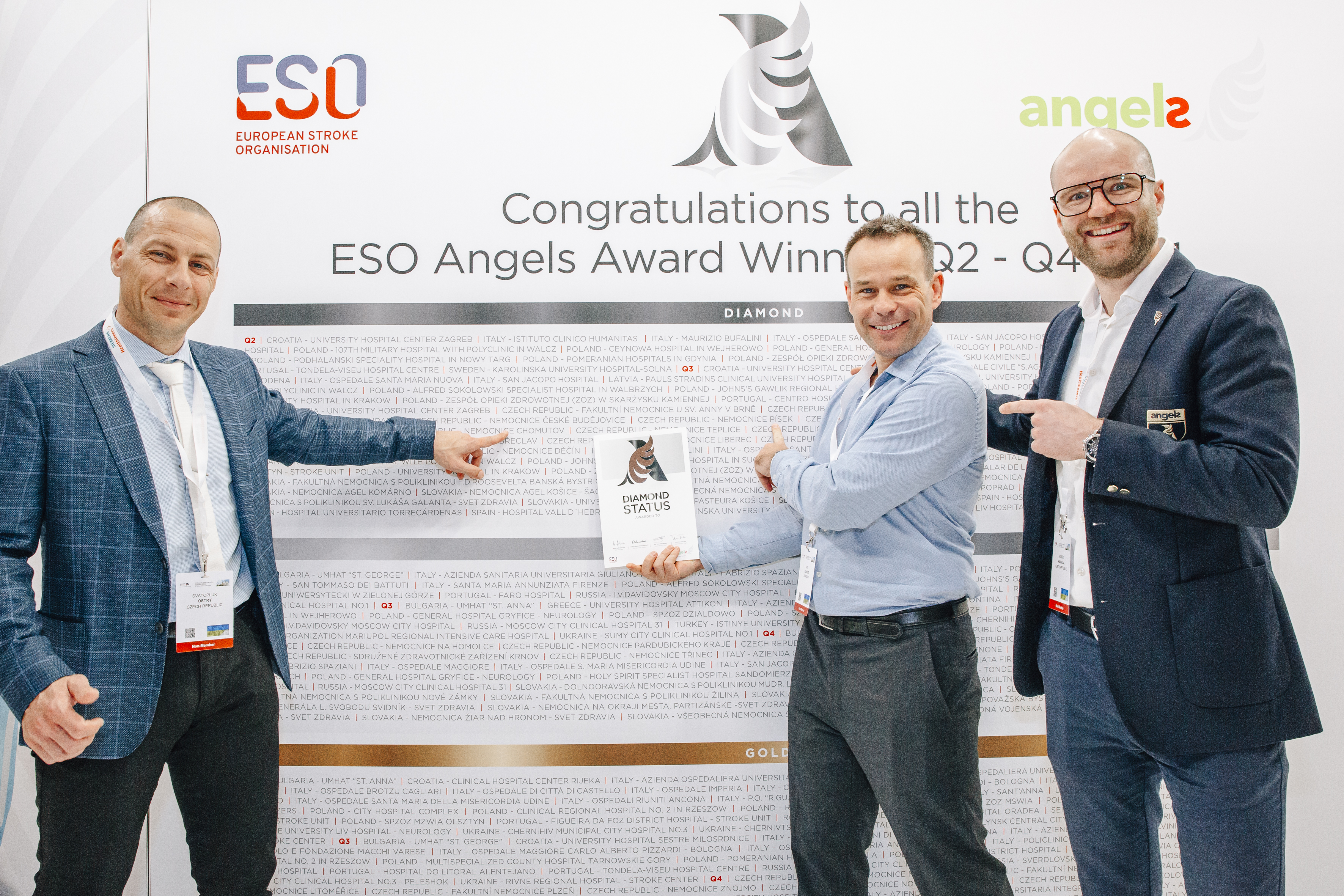
이제 우리의 협력은 완벽합니다
상황이 매우 다르고 매우 낫습니다. Dr Robert Rezek의 견해를 원한다면 피섹 시의 주요 중심지인 Hospital Písek의 뇌졸중 병동 수석 의사인 Dr Robert Rezek을 보십시오. 이 병원은 체스케 부디비체 북서쪽으로 약 45분 거리입니다. Hospital Písek은 체코 공화국의 40개 다이아몬드 병원 중 하나로, 작년 두 번째로 차별화된 병원입니다. 평균 DTN 시간은 17분입니다.
13년 전 프라하에서 온 Dr Rezek은 뇌졸중 치료 시스템이 이미 마련되어 있었지만, Ostr MOXR 박사의 '바데스카'의 개입에 따라 해당 센터와의 협력이 개선되었고 해당 지역의 뇌졸중 환자가 높은 수준의 종합 치료를 받을 수 있었다고 말합니다.
“이전에는 대혈관 폐색 환자들에게 양질의 치료를 제공할 수 없었습니다. 그러나, 2013년 이후로 차에스케 부디비치의 뇌졸중팀 전체가 변화했으며, 이제 우리의 협력은 완벽하고 기계적 혈전절제술의 비율은 급격히 증가했습니다.”
1차 센터와 종합 센터 간의 완벽한 협력은 가능한 한 효율적으로 센터 간 환자를 이송할 수 있을 뿐만 아니라 적절한 병원에 적합한 환자를 선택할 수 있는 잘 훈련된 앰뷸런스 서비스에 달려 있습니다.
구급대원 교육은 전체 시스템을 개선한다고 Dr Rezek은 지적합니다. 이를 위해 그는 2022년 가을에 학생이 되었으며, 부다페스트에서 Angels가 진행하는 첨단 뇌졸중 생명 유지 교육 워크숍에 참여하여 인증된 ASLS 강사가 되었습니다.
"그는 훌륭한 선생님입니다."라고 Martin Liptay는 말합니다. 그의 교훈은 이 지역의 응급 구조대원들에게 인기가 많으며, 그는 선도적인 뇌졸중 전문의로부터 기꺼이 통찰력을 얻고 있습니다.
의사가 되기로 결정한 18세의 Robert Rezek은 "사람을 돕고 세상을 개선"한다는 충동에서 그렇게 했습니다. 신경과 전문의가 된 것은 그의 행운이었다고 그는 말합니다. 이 병원이 뇌졸중 치료 프로그램을 개선하고 뇌졸중을 위한 안전한 장소로 남보헤미아를 발전시키는 데 도움이 되도록 프라하에서 피섹으로 그를 데려온 일련의 행운의 우연이 있었습니다.
프라하와 같은 대도시에서 일할 때는 책임 부담이 더 크다고 Dr Rezek은 말합니다. “프라하에서는 다른 사람에게 도움을 요청할 수 있지만, 우리 지역에서는 환자를 스스로 돌보아야 합니다.” 이러한 이유로 그는 Angels가 육성하는 공동체 의식과 "다른 병원과 투쟁과 성공을 공유하고 서로에게 영감을 주는" 기회를 소중히 여깁니다.
오타바 강을 가로지르는 이 역사적인 마을에 도착한 후 그의 최우선 순위는 환자를 위한 물류를 바꾸는 것이라고 Dr Rezek은 말합니다. “이전에는 팀이 구급차에서 환자를 만났고 환자가 CT실로 이송되기 전에 신체검사를 완료했다. 시간이 걸렸습니다. 이제 구급대원들이 더 나은 선택을 할 수 있도록, 환자가 도착하기 전에 환자를 준비시키고 CT실에서 환자를 받습니다. 먼저 신체검사 전에 스캔을 실시하며, 재개통을 시작하기 전에 실험실 결과를 기다리지 않습니다.”
마지막으로, CT에서 환자를 치료하면 도착에서 주사까지 걸리는 시간을 몇 분 더 단축할 수 있습니다.
뇌졸중 의약품의 엄청난 발전
"환자를 CT로 직접 이송하는 것은 치료 시간을 줄이는 데 큰 진전이었습니다."라고 Dr Marek Slab는 말합니다. Marek Slab MOXR는 EMS 국가 협회의 회장이자, 남보헤미안 지역의 EMS 이사이며, 체코 상원의 Tábor 지역을 대표합니다.
병원과 앰뷸런스 서비스 간의 표준화된 협력은 치료 시간에 상당한 영향을 미쳤다고 Dr Slab는 말합니다. 그는 체코에서 뇌졸중 네트워크 형성으로 이어지는 논의에 참여했으며, 그 결과 뇌졸중으로 인한 장애가 감소하고 있다는 사실에 만족합니다. 뇌졸중 센터 네트워크를 정의하고 분류 규칙을 정하는 것은 뇌졸중 의약품의 엄청난 발전이었다고 그는 말합니다.
"올바른 병원으로의 효과적인 의사소통과 분류에 대한 규칙이 '제슈 부드비치의 뇌졸중 센터와 합의된 후, 모든 주요 매개변수가 극적으로 개선되었고 소규모 비치료 병원으로의 환자 이송이 거의 완전히 제거되었습니다. 적절한 용어에 대한 지식은 응급구조사가 뇌졸중 센터와 보다 효율적으로 소통하는 데 도움이 되었습니다.”
EMS 상은 또한 환자 데이터의 수집 및 평가에서 도출된 피드백 덕분에 병원 전단계 뇌졸중 치료 품질에 긍정적인 영향을 미쳤습니다. "사람들이 자신이 하는 일을 보는 것이 중요하다"고 Slab MOXR 박사는 말합니다.
2005년에 세 번의 플래티넘 및 한 번의 다이아몬드 어워드를 수상한 남보헤미안 지역의 EMS가 설립되었으며, 거의 20년이 지난 후 Slab MOXR 박사는 그의 일상 업무를 경감시키는 강력한 팀에 의지할 수 있습니다. 그럼에도 불구하고, 그는 지역 정치장과 합의하여 자신의 다른 책임이 너무 까다로워질 경우 한 발 물러서서 정규 EMS 의사로 일할 것입니다. 그러나 그는 자신의 많은 역할 사이에서 전환하는 기술을 숙달했으며, 정치인으로서의 경험이 건강과 사회적 문제 간의 연관성에 대한 이해를 높인다는 것을 알게 되었습니다.
그는 또한 국가 간 협력에 대한 논의에 영향을 미칠 수 있었으며, 이는 환자들에게 매우 중요하다고 말합니다. "예: 쇼핑의 경우 관광, 국경 간 업무 및 국경 간 통근 때문에 의사소통과 협업이 필수적입니다."라고 Dr Slab MOXR는 말합니다. 독일과 오스트리아는 이미 계약을 체결했으며, 남보헤미아와 오스트리아 어퍼와 같은 개별 지역 간에도 계약이 체결되어 있습니다. Kulyk 박사가 지적한 바와 같이 시민들은 동일한 산과 계곡을 주시합니다.
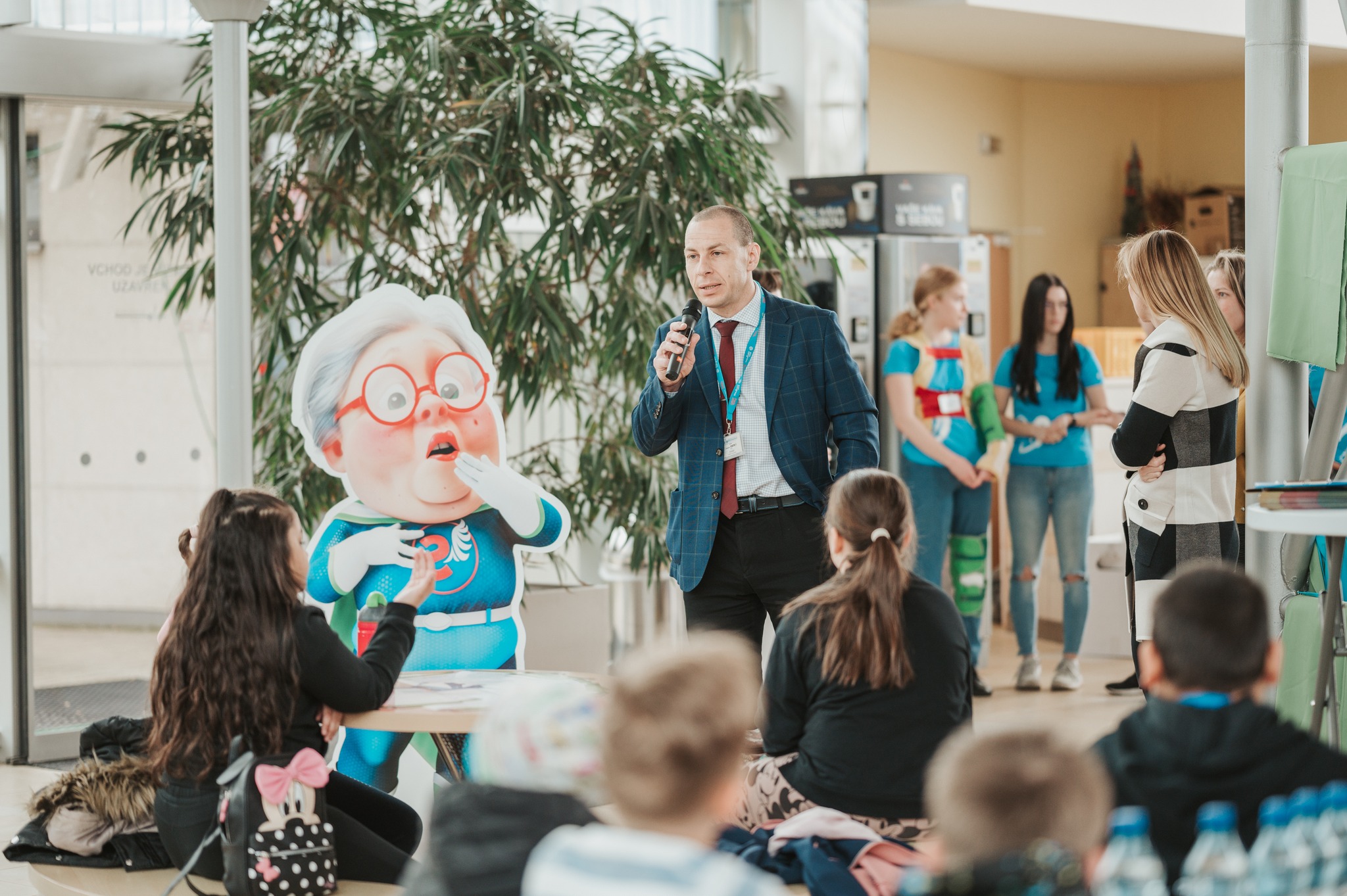
비교 지점
Kulyk 박사는 “응급 요원에 대한 지속적인 교육이 필수적입니다”라고 말합니다. 도착하는 환자의 사고방식에 대한 통찰력과 hyperacute 단계에서 스톱워치를 사용하여 시간이 뇌라는 것을 상기시키는 것 외에도, 그녀는 Ostr MOXR 박사와 Rezek 박사의 예를 따르고 응급구조사에 대한 뇌졸중 교육을 우선시하고자 합니다.
“병원 전단계 분류를 최적화한 후, CT 스캔에서 환자를 직접 만나는 것이 DTN 시간을 단축하는 다음 단계일 것입니다”라고 그녀는 말합니다. "환자들이 여전히 뇌졸중 모방을 배제하기 위해 응급실에서 분류해야 한다고 생각하는 순간.
또한 이 첫 번째 병원 내 평가를 사용하여 환자를 CT 또는 MRI로 보낼지 여부를 결정합니다. 급성 뇌졸중 MRI 프로토콜은 짧지만(10분) CT보다 더 오래 걸립니다. 도전 과제는 매우 빠르고 정확한 골든 중간점을 찾는 것입니다.”
모든 프로세스가 조건에 적응하지 않고 다른 시설로 이전될 수 있는 것은 아니지만, Ostr MOXR 박사는 입증된 개선의 프레임워크 내에서 주요 단계를 복사할 수 있음을 유지합니다.
"우리는 다른 사람들에게 모범이 된 것을 자랑스럽게 생각하며, 이를 어떻게 할 수 있는지 보여준 것을 매우 기쁘게 생각합니다."라고 그는 말합니다. 그러나 국가 간 협력은 2차적인 효과이며, 남보헤미아에서 표준치료를 높이는 것이 여전히 일차 목표입니다. 이를 위해 그는 또한 Angels 운영 위원회의 위원으로 활동하며 이 지역에서 FAST 히어로 인식 캠페인의 홍보대사입니다.
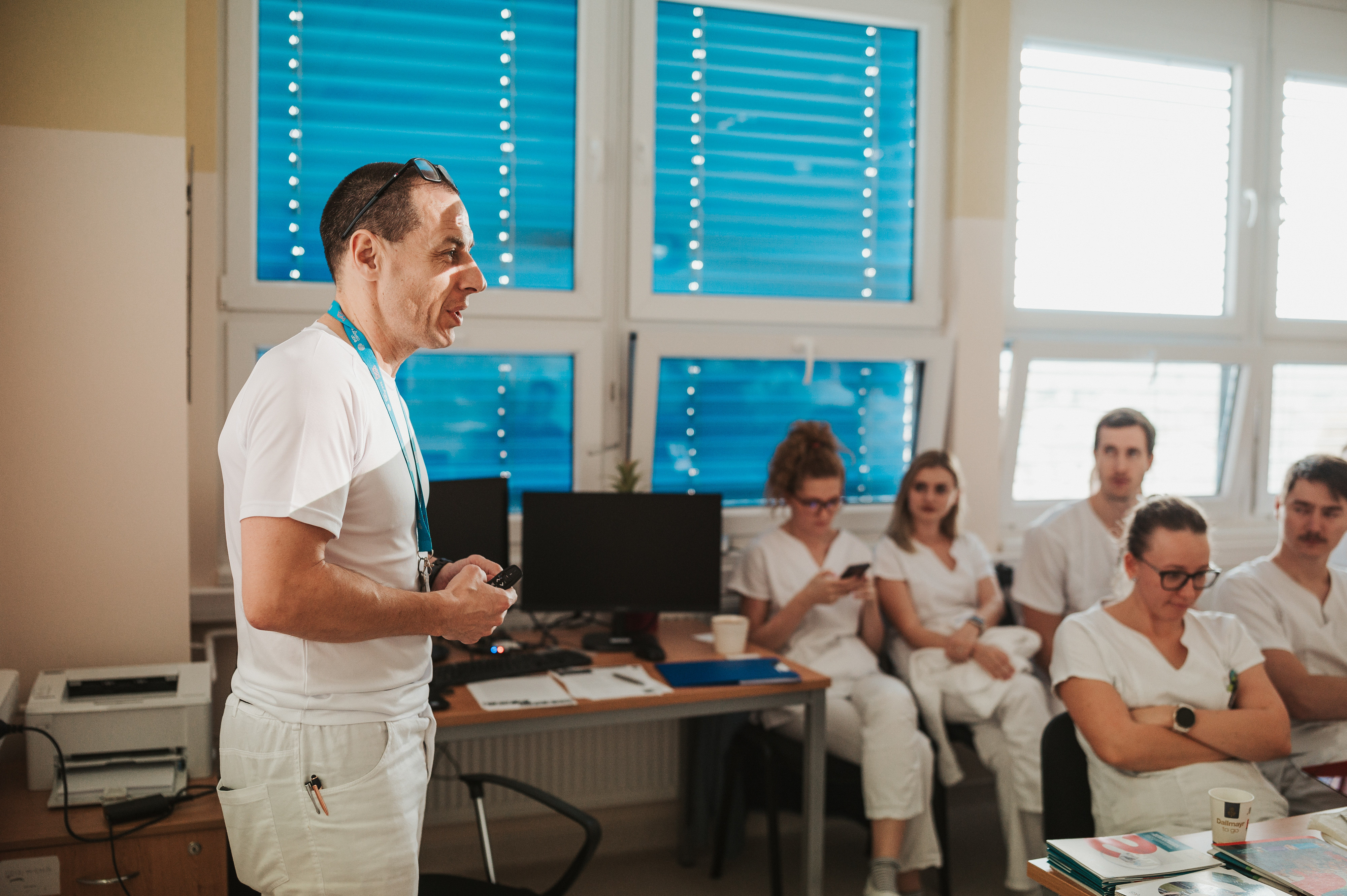
공감 자극
닥터 오스트루는 체코 북부 모라비아에서 자랐으며 수학과 과학에 중점을 둔 학교에 다녔습니다. 그의 학교 친구들은 대부분 경제학, 수학 및 물리학을 공부했습니다. Svatopluk Ostr MOXR은 직업으로 약물을 선택한 소수의 사람들 중 하나였습니다. 그는 실생활에 규칙을 적용할 수 있는 잠재력과 다른 사람들의 삶에 영향을 미치기 위해 지식을 사용할 수 있는 잠재력에 주로 매료되었다고 말합니다.
신경외과는 논리적 논쟁, 빠른 의사 결정 및 직접적인 행동의 가능성을 제시했으며, 뇌졸중 치료에서 유사한 특성을 발견했습니다. “치료할지 여부와 치료 방법을 결정해야 합니다”라고 그는 말합니다. 더 흥미롭게 만드는 것은 가이드라인에도 회색 영역이 남아 있기 때문에 어떤 옵션이 가장 좋은지 모든 경우에 절대적으로 확신할 수 없다는 것입니다.
Ostr MOXR 박사의 연구는 급성 뇌졸중의 진단 과정에 신경생리학을 구현하고 급성 허혈성 뇌졸중을 치료하기 위한 세 번째 옵션, 즉 기계적 혈전제거술에 실패한 경우 미세수술을 통해 혈전을 제거하는 방법을 탐색하는 데 중점을 둡니다. 두개내 시술에서 혈전 제거 프로토콜을 개발하기 위해 유명한 신경외과 의사인 Ji MOXRí Fiedler 박사인 Hospital MOXReské Bud MOXRjovice 동료와 팀을 이루어 신경외과 및 신경생리학 분야에서의 이전 진료가 진행되고 있습니다. 이들의 공동 결과물은 병원에서 수행되고 있는 개척 작업에 세계인의 관심을 끌었습니다.
Hospital şeské Bud MOXRjovice가 Ostr 박사, Rezek 박사, Slab MOXR와 같은 의사들이 뇌졸중 치료의 모든 측면에서 리더십을 제공하는 지역에서 전문성 개발을 추구하는 사람들에게 자석이라는 것은 바로 그 이유입니다. 이들은 곧 또 다른 역사적인 마을에 있는 Hospital Jind=ichŜv Hradec에 합류하게 되는데, 이 병원은 또 다른 역사적인 마을에 새로 인증을 받은 뇌졸중 센터로서, "예스케 부디"에서 북동쪽으로 약 42km 떨어진 곳에 있습니다.
Ostr MOXR 박사의 날개 아래 미래의 뇌졸중 의사들은 전문성 성장 이상의 것을 기대할 수 있습니다. 개인 개발도 강조하고 있습니다. 이 아이디어는 공감 능력과 다른 사람들의 관점에서 문제를 바라보는 능력을 키우는 것이라고 Ostr MOXR 박사는 설명합니다.
"우리 모두가 같은 것은 아니며, 이는 오해의 가능성을 높입니다. 우리 모두는 동일한 문제를 가지고 있을 수 있지만 다른 관점에서 본다. 중요한 것에 대한 각 개인의 계층 구조는 다르며, 함께 일하려면 다른 사람이 더 잘 이해하기 위해 덜 중요하거나 더 중요하다고 생각하는 것이 무엇인지 알아야 합니다.”
그게 최고가 되는 방법입니다.
